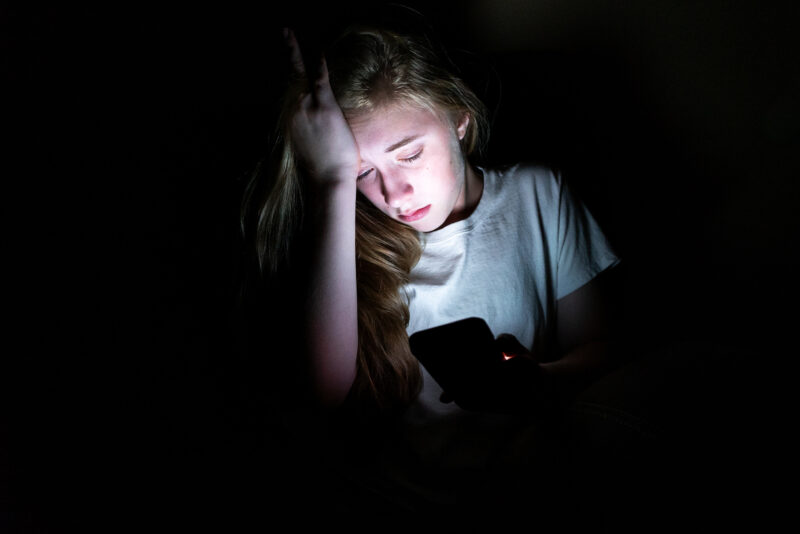
When U.S Surgeon General Dr. Vivek Murthy issued a 19-page advisory warning the public of the risks of social media to young people, Drs. Michael Redovian and Kristen Cannon read it with the interest of professionals who work daily with children, teens and young adults struggling with behavioral health issues.
Dr. Redovian, a pediatric psychiatrist, often discusses social media use with his patients, including as they begin Akron Children’s Partial Hospitalization Program (PHP), an intensive outpatient program to help teens learn coping skills for depression, anxiety and other behavioral health challenges.
Dr. Cannon is a psychiatric fellow who has a special interest in the impact of social media on body image and disordered eating.

Drs. Redovian and Cannon welcomed the strong language in Dr. Murthy’s report and shared their own observations and the take-aways of this report for parents.
Pros and cons of social media for teens
It’s important to note that Dr. Murthy’s report cited some benefits of social media, such as allowing adolescents who otherwise feel isolated to socialize with peers, even those they may never see in person.
But the report elevates long-standing concerns about the role social media has played in the adolescent health care crisis. The advisory noted that technology companies have a goal of keeping users online so addictive algorithms may have lured children into becoming “unknowing participants in an decades-long experiment.”
It can be a challenge for mental health professionals and parents to understand how much of a factor social media can be on a child’s behavioral – and even physical – health because teens tend to downplay or, perhaps, not fully understand the impacts themselves.
“Kids tend to minimize it, even if it something like cyberbullying,” said Dr. Redovian. “If you ask them how it affects their mental health, they will probably say, ‘No, it doesn’t impact me; I can let it go,” but as you probe more about the ‘drama’ playing out online with their friends, they will admit to being up to 3 a.m. trying to navigate a group chat.”
Dr. Cannon said more and more research clearly points to the impact of social media on body image.
“There’s so much comparison for young women – and men too – and everyone puts their best foot forward on social media,” said Dr. Cannon. “So just as young people are starting to figure out who they are, they are now comparing themselves to others on their social feeds. A more blatant and sinister effect is that social media has a lot of pro-anorexia content that’s very easy to stumble upon.”

Drs. Redovian and Cannon on these tips for parents:
Don’t rush into the smartphone decision
While there is lots of peer pressure on kids to have their own smartphones, parents can save some money and peace of mind by moving slowly on this decision. For pre-teens, a flip phone may be the first step. It will allow you to communicate changes in the after-school schedule, while delaying access to apps like Instagram and TikTok.
Be very hands-on, very early
Once your family agrees to purchase a smartphone for your child, establish rules of the house. Examples of rules could include:
- Parents have log-in information and passwords to phone and social media apps
- Only one social media account to start
- Parents review posts (this rule can be relaxed as good judgment is shown)
- Nothing too personal can be shared (give your child specific examples)
- Privileges are lost if grades slip
“Parents may find it’s hard to put in rules that didn’t exist before,” said Dr. Redovian. “But if you have those expectations from the beginning, your job will be easier down the road.”
Note: the surgeon general’s report has a link to help parents create a family media plan: https://www.healthychildren.org/English/fmp/Pages/MediaPlan.aspx
Protect bedtime
Everyone needs a break from the “online world” during the day, and especially at bedtime. Good rules are “no phones” at the dinner table and during social gatherings. But many parents probably don’t realize how much of a factor a lack of sleep can be in their child’s behavioral health challenges. That’s why most experts, including Drs. Redovian and Cannon, suggest parents do not allow smartphones in the bedroom after a certain time each night. It’s just too difficult for teens to ignore notifications and tune out the chatter.
“Sleep is so important for adolescents as the brains are still maturing,” said Dr. Cannon. “It’s a factor in mood and mental health. Having that bright screen in front of your face is encouraging your brain to stay awake.”

Stay engaged
Know which sites your kids are on and ask them about content they like and don’t like, what they think is funny or interesting and why. Discuss what makes some social media influencers more credible than others on topics like nutrition and fitness. Ask questions like, “Have there been times when you have felt social media was unsafe or uncomfortable for you because of things being shared?” or “Do any of these accounts make you feel worse about yourself?”
Parents should be aware that the problems with social media might not be in the original post by your child or a friend, but on the comments that follow it.
Teens are likely to get defensive if asked questions like “Do you feel like social media is controlling you?” Instead, Dr. Redovian has found success in asking teens about the “drama” happening in the social media circles at the moment.
“That seems to open of a different conversation,” he said. “And depending on what’s shared, you may learn it’s pretty harmless stuff or a potentially serious situation unfolding.”
Be a good role model
Your children will be more likely to adopt healthy smartphone habits if you model them yourself. That means taking lots of breaks from screens for healthy activities, hobbies and time with friends and family.
Be curious, not judgmental
You are likely to learn more about what’s going on in your teen’s life if you approach conversations with a sense of curiosity rather than giving the impression “you might be in trouble.”
“A lot of adolescents really enjoy the opportunity to teach and feel like they are experts,” said Dr. Cannon. “So, if you give them the opportunity to teach you something about social media, they will likely grab it.”
Navigating the future
Smartphones and social media are here to stay and, for good and bad, they have become part of the landscape of daily life for most people.
“Social media can be useful, and the report highlighted that very well,” said Dr. Redovian. “But there are pitfalls, and a lot of that is putting kids and adolescents in a position where they don’t know how to handle what they are seeing.”
If you think your child is spending too much time online, you might want to consider why. Is it because they feel socially isolated? Dr. Redovian believes kids who are on their screens close to 24/7 with almost no in-person opportunities for socializing are at most risk.
Red flags that social media could be a problem include:
- Signs of depression (isolating in the bedroom, being more irritable, moodiness)
- Drop in grades or less interest in normal activities
- An effort to restrict electronics results in a reaction above and beyond what you would normally expect (screaming, threatening, physical resistance)
As teens get closer and closer to independence, and are making good decisions, parents can be more flexible on their rules and relax their oversight.

But social media will always be prone to misinformation and disinformation.
“Social media can be wonderful and it can also sometimes be a lot of garbage for even the most well-adjusted teen to sort through,” said Dr. Redovian.
The bottom line is staying involved, keeping the dialogue open, remaining non-judgmental but knowing when it’s time to press for more information.
As Dr. Cannon notes, “Your child’s safety will always trump his or her right to privacy.”
If you have concerns about your child’s mental or physical well-being, make an appointment with their doctor.










